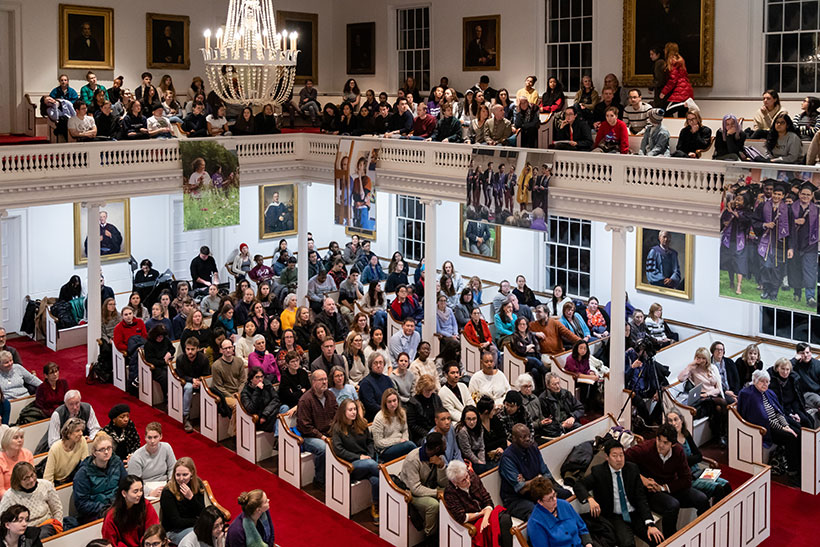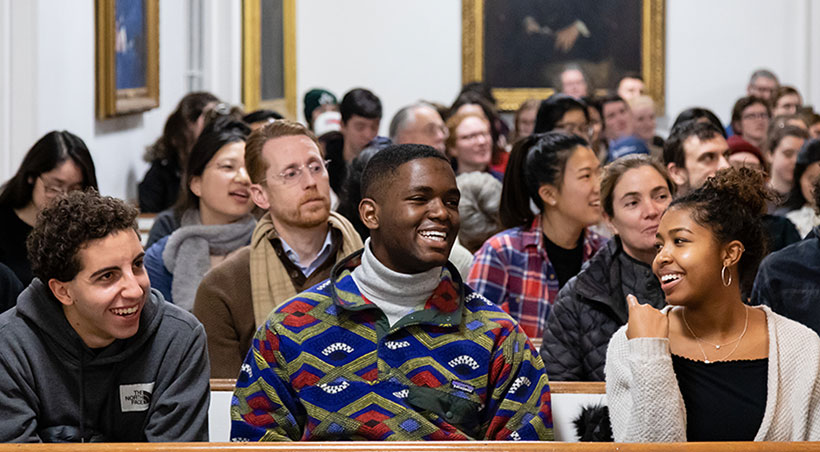“They would not like most of you,” said Tara Westover, with a rueful smile, as she gestured to the crowd in Johnson Chapel.
She was speaking of her survivalist parents back in Idaho, who appear in her #1 New York Times bestselling memoir, 2018’s Educated. They distrust most mainstream institutions—the government, hospitals, schools—and her own homeschooling was scattershot. She’d never heard of America’s civil rights movement, for instance, until her first year at Brigham Young University, which admitted her on scholarship.
Westover came to campus on Feb. 6 for an event titled “What Would Equality in Education Look Like?”: A Conversation with Tara Westover and Tony Jack ’07.
The two are friends at Harvard: Jack, a sociologist, is an assistant professor of education there and the author of 2019’s acclaimed book, The Privileged Poor: How Elite Colleges are Failing Disadvantaged Students. Westover is a senior research fellow at the Harvard Kennedy School’s Shorenstein Center, working on initiatives connected to media and political polarization.
Westover told the audience that she was compelled to write about the power of education, and realized that her story could carry that story. Jack wanted to right a wrong: “When I first saw people write about first-generation and low-income college students, I thought, ‘They get the story about half-right.’ I was inheriting the consequences of people who were setting policy at colleges and universities but were not dealing with the full complexity of understanding our experiences.”

The event’s moderator was Leah Schmalzbauer, the William R. Kenan Professor of American Studies and Sociology. She posed questions generated by students in her Spring 2019 course “Unequal Childhoods: Race, Class and Gender in the United States,” who read both Educated and The Privileged Poor.
Schmalzbauer asked the pair how their hometowns shaped the way they think about education and equality.
Jack, who grew up in Miami, recalled the traumas of place: the sound of gunshots, the daily grind of hypervigilance, how when you walk to school “you have to keep your head on swivel.” He added: “It’s hard to concentrate on work when you have this fight-or-flight as your norm.” Now, as a sociologist, he sees the larger forces at work, how African Americans were clustered together from redlining, for instance.
Westover said that in rural areas, “it’s often less about inequality in that town, but more that the whole ecosystem has had no or little growth because of the changing nature of economy.” A generation ago, most Idaho kids would have grown up to be farmers, she said, but that’s no longer a viable profession. “We do not talk about rural issues a lot, but that’s 20 percent of the population—and this whole chunk of the country thinks the future is not for them.”
Schmalzbauer inquired about the personal cost of educational mobility. Jack spoke of his family’s full-blast emphasis on getting him admitted to college, but how he and they hadn’t thought of what came after that. As he put it: “The first-generation college student experience evokes the immigrant narrative, in that you’re leaving one culture for another.”

Next, Schmalzbauer asked Westover and Jack to pose each other a question. He asked her to comment on how questions on rural life can be highly racialized since whites usually predominate in rural populations.
Westover mentioned the strong Latino community in her Idaho hometown but admitted that there’s not much interaction between that community and the white majority and wondered if the rural minority narrative had gotten its due. This led her to lament the reductionist depiction of rural lives in general. Rural areas mostly appear on TV as the scene of a crime, “with weird rural people, and the CSI people from the city who solve the case,” she said.
Westover, in turn, asked Jack about the title of his book, wondering if he meant the phrase “privileged poor” to be provocative. He said yes, in that it so well explains that low-income students who go to prep school are more familiar with college life, while low-income students who attend under-resourced public schools miss that privilege, and thus are “doubly disadvantaged.”
Jack revealed that he was inspired to use vivid language in his book, and downplay the jargon, after unearthing a paper he’d written for Professor of English Marisa Parham, which reminded him how he loved to write in a more creative way.

Schmalzbauer asked if Westover and Jack had words of wisdom for students on how to approach their education. Westover urged students to think outside their family’s expectations. “It’s hard to develop empathy for yourself,” she said. “But self-empathy is not arrogance or indulgence. Give yourself slack, understanding.”
Jack mentioned the wide range of subjects he studied as an undergraduate, from chemistry to Buddhism, and that he still reached out to Amherst professors as his academic career advanced: “Take every advantage. Get in the habit of reaching out and taking ownership of access and institutional resources. Go to therapy. Take a summer internship you would never have thought of. This place has transformative powers that allow you to become a better you in ways you never thought possible. The greatest skill I have developed is the skill to ask for help.”

